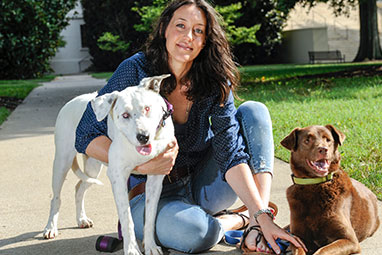Joining the comfort animal debate
Wofford professor leads team on quest to research the effects of witness comfort items on jury verdicts
SPARTANBURG, S.C. – Facility dogs and comfort items remain credible resources in the courtroom thanks to researchers such as Dr. Dawn McQuiston, Wofford associate professor of psychology.McQuiston, associate professor of psychology at Wofford College, first learned of the debate over animals in the courtroom when she came across a case in which an attorney’s personal use of a therapy dog during trial was challenged on the grounds that it was biasing to the jury.Intrigued, she discovered other instances in which vulnerable witnesses, for example, alleged victims of sexual abuse, needed comfort items to quell anxiety while giving testimony. Again these comfort items were challenged. Defendants appealed their guilty verdicts on the grounds that the items gave victims an unfair edge because they caused the jury to pity them and potentially over believe their side of the argument.“Every time, the appeals court confirmed the lower court’s verdict because it didn’t see any bias on the part of the jury, but despite these rulings the issue had never been scientifically tested,” says McQuiston, who decided to interview a facility dog handler in Maricopa County, Ariz., and gather more information about their training. “About half of the states in this country use facility dogs, and all they do is sit quietly by the victim’s feet or in their periphery to give them a sense of protection and comfort.”According to McQuiston, the dogs are expertly trained and have an air of professionalism, similar to that of guide dogs.McQuiston thought it was possible that a trained dog or stuffed animal could evoke undue sympathy among jurors, so she and her students decided to test the hypothesis. They wrote fictional court cases based on real events in which young sexual abuse or robbery victims clutched stuffed animals or facility dogs during their testimony in the courtroom, compared to cases in which the victims did not have access to comfort items. They then examined the verdicts delivered by mock jurors. McQuiston and her team found that comfort items in fact had no impact on jury decisions.The group also looked at emotional reactions of jurors when a comfort item was present and found that some jurors experienced disgust during the trial, mainly when the witness clutched a teddy bear on the witness stand. McQuiston explains that jurors often experience strong emotional reactions, such as disgust and anger, which can affect their attitudes toward the defendant and, in turn, conviction rates.McQuiston’s research demonstrates that appeals based on facility dogs in the courtroom are unfounded, and judges no longer must rely on their instincts when weighing questions of fairness when it comes to their presence. The American Psychology-Law Society published the research McQuiston performed with team members Colin Hayton ’16, a Wofford psychology major and philosophy minor from Greensboro, N.C., who will be studying law at Wake Forest University in the fall, and Kayla Burd, a doctoral student at Cornell University focusing on the study of legal decision-making.McQuiston plans to take the research a step further by interviewing mock jurors to see whether comfort items changed their personal opinions even though they did not change their verdict, and by examining how deliberations affect their views on the use of facility animals. In light of her findings, she also has plans to encourage lawmakers in South Carolina to consider adopting the use of facility animals in the courtroom.“There are many benefits of having a dog assist children in vulnerable situations,” says McQuiston, “and now we have scientific evidence that legal appeals on the grounds that a facility dog is biasing in the courtroom are unfounded.” by Quinn Filler